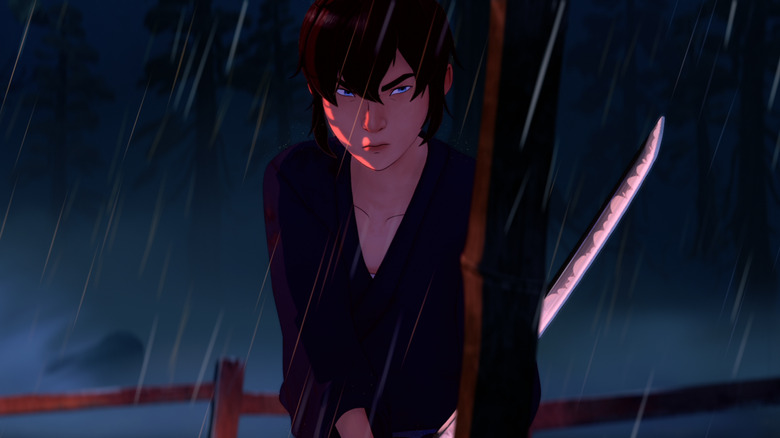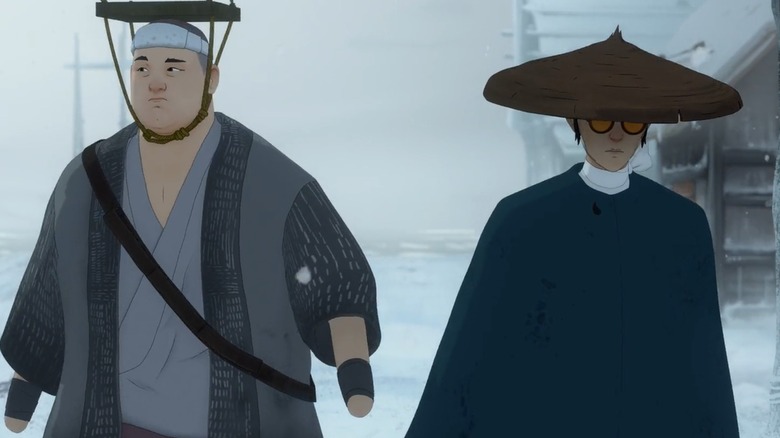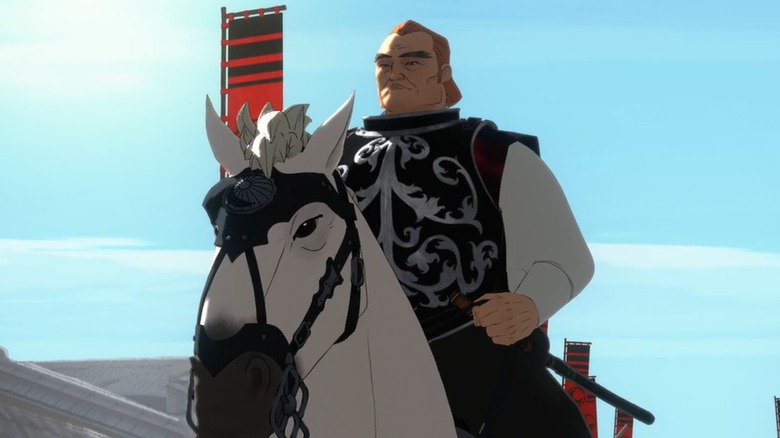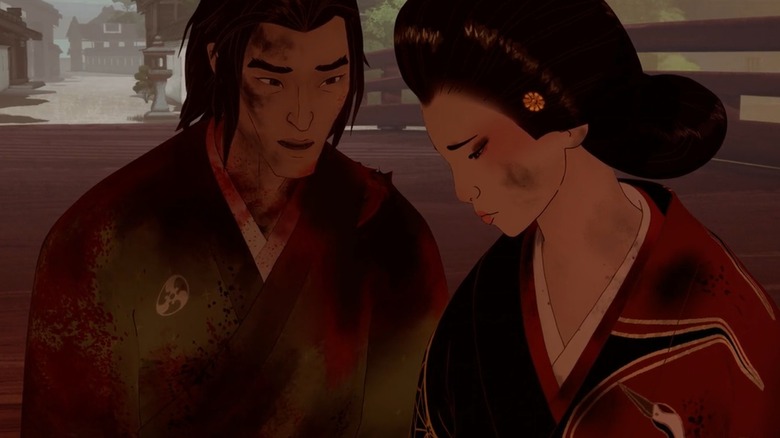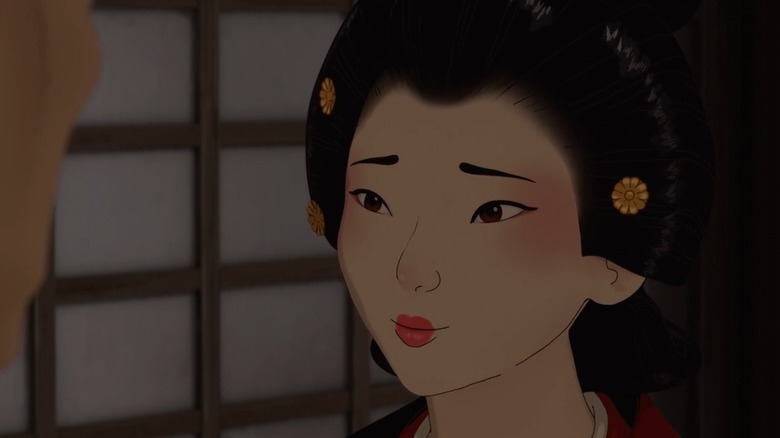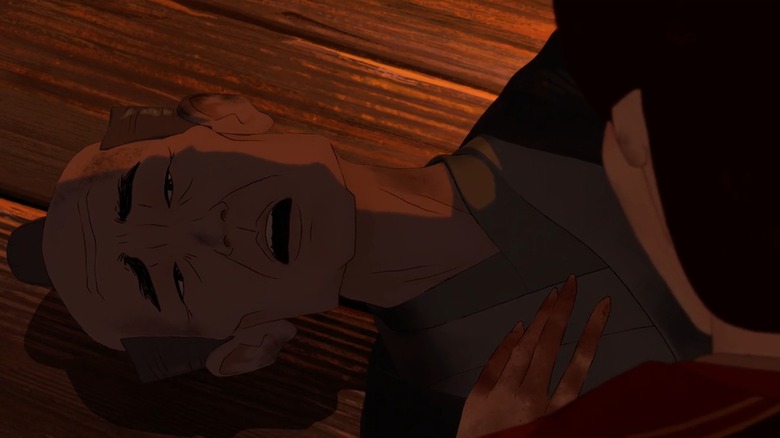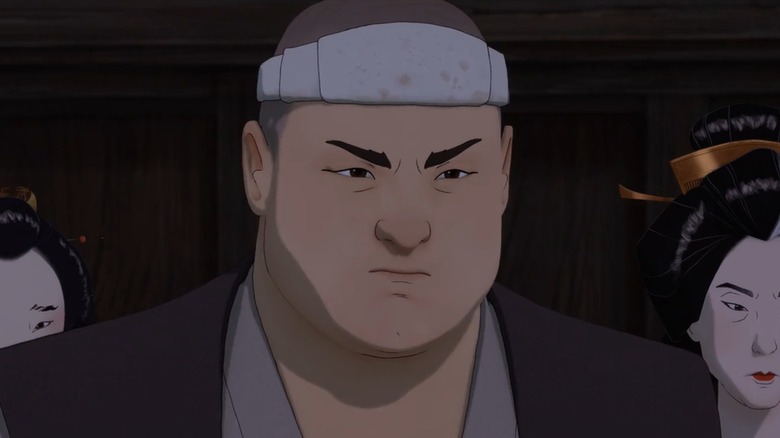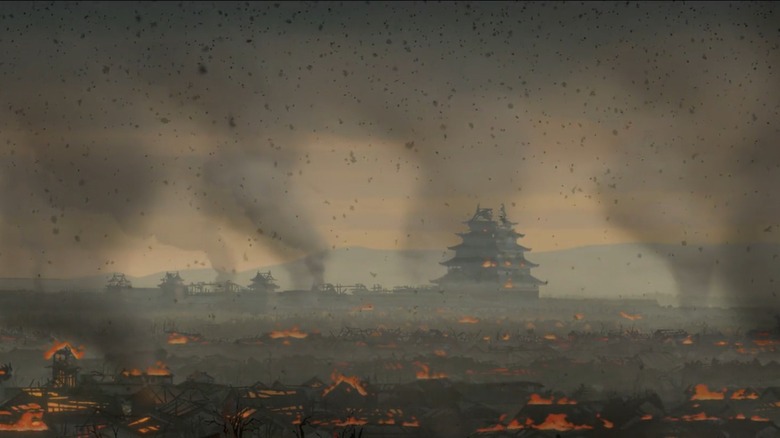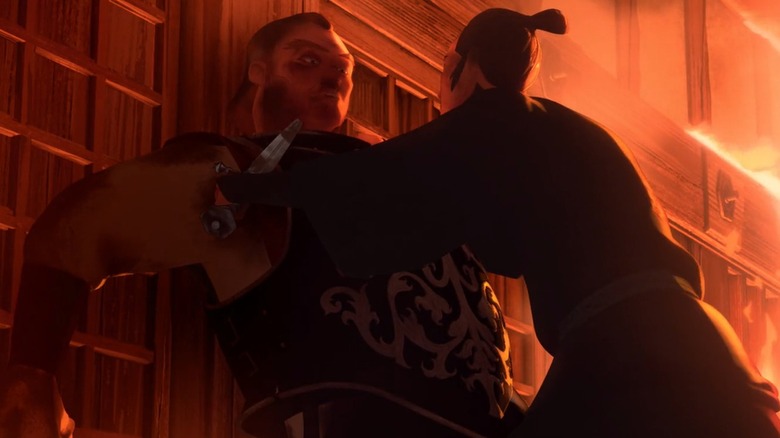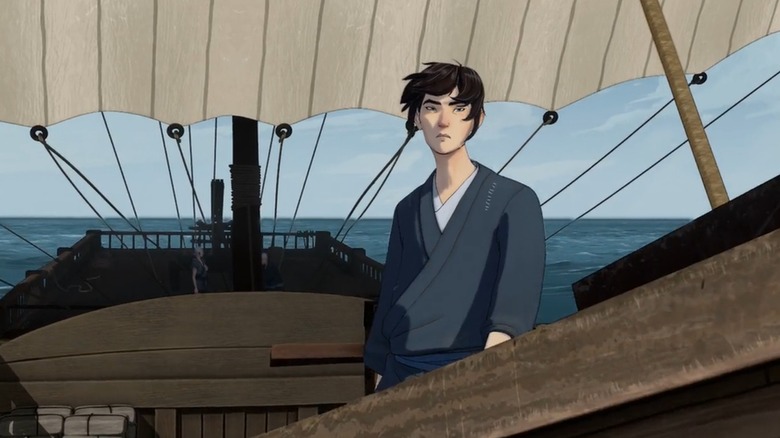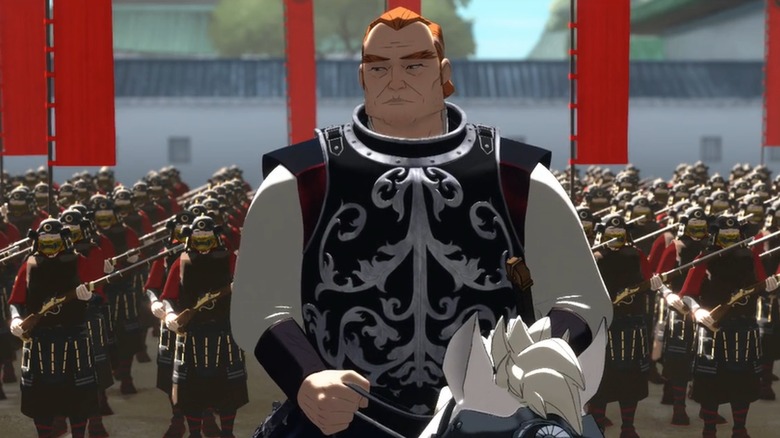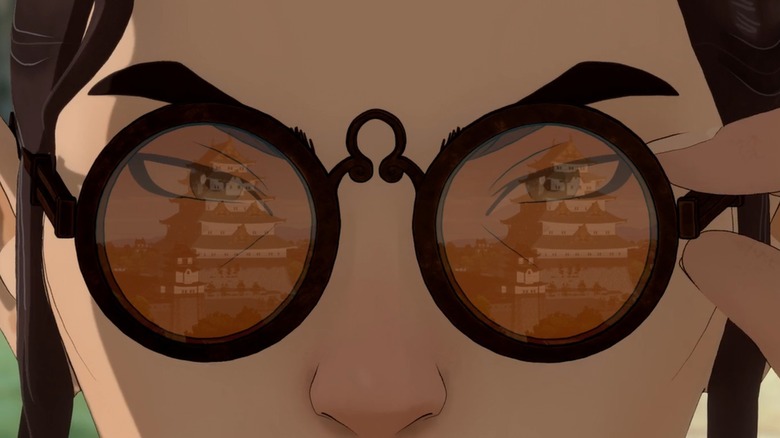The Ending Of Netflix's Blue Eye Samurai Explained
When Guillermo del Toro snagged his Oscar for best animated feature with Netflix's "Pinocchio," he didn't just thank his collaborators — he also dropped some wisdom: animation isn't a genre, it's just a medium. Netflix must've adamantly agreed because little did fans know that the streamer had "Blue Eye Samurai" in their back pocket, a gem by the dynamic duo Amber Noizumi and Michael Green.
"Blue Eye Samurai" is set in 17th century Japan, better known as the Edo period for the history buffs. While some in contemporary Japan still consider this period their golden age, and it would have been quite intriguing to take a deep dive into that period, the story that fans of "Blue Eye Samurai" got isn't overtly political; it instead leans more towards action-adventure (think "Kill Bill" meets "The Witcher"). Back then, Japan closed its borders to the world, not even allowing trade except for a few higher-ups who kept ties to the West illegally anyway. Plus there was serious xenophobia, and mixed-race kids were treated like they were demons.
"Blue Eye Samurai" expertly blends the Western genre with Eastern culture, and the show's animation and fight scenes are top-notch. In this deep dive into the ending of "Blue Eye Samurai" Season 1, we'll appreciate the storytelling wizardry that made it a hit with critics and decode the epic ending to analyze what it all really means.
What you need to remember about the plot of Blue Eye Samurai
Mizu (Maya Erskine) was born with blue eyes, a distinctive trait that immediately marks her as having a mixed heritage. Growing up, she lived in secrecy, hidden away because her mother claimed that the man who fathered her was on a mission to eliminate all his children and sever his ties to Japan. Mizu, left in the dark about the reasons behind her father's deadly intent, followed her mother's guidance, cutting her hair short and assuming the guise of a boy to evade those searching for a girl with blue eyes.
Many questions linger about Mizu's true parentage and the circumstances that spared her from death at birth. However, her anonymity is shattered when Mizu and her mother are discovered, and their house is set ablaze. It is during this traumatic childhood event that Mizu vows to seek revenge. Fate leads her to live and grow under the mentorship of the renowned blacksmith Master Eiji, affectionately known to Mizu as The Swordfather (Cary-Hiroyuki Tagawa).
As Mizu matures, she takes on the dual life of an assassin, becoming one of the most lethal sword masters in the land. Her quest is to find the four Western men who could potentially be her father. By the time the audience meets her, Mizu has already claimed her first victim and marked it on her skin, and her next target is Abijah Fowler (Kenneth Branagh).
What happened at the end of Blue Eye Samurai?
Mizu's quest to find Fowler leans heavily on the unparalleled technical skills she acquired thanks to the privilege of learning from the best samurais in the land, all of whom sought a sword from Master Eiji. Confident that the techniques that served her well against the first Westerner will prove effective once again, Mizu embarks on her next journey — except she faces unique challenges this time. Unexpectedly, she forms alliances along the way.
Her closest companion turns out to be an insistent apprentice, Ringo (Masi Oka), in search of a meaningful purpose in his life. However, upon discovering Mizu's willingness to sacrifice anyone for her revenge plot, Ringo distances himself. A similar revelation occurs with her next closest ally, Taigen (Darren Barnet), who initially starts as a bully but develops mutual respect for Mizu. He, too, learns about Mizu's dark intent.
Learning from her mistakes, Mizu decides to shelve her vengeance plot and joins Taigen in his mission to save Princess Akemi (Brenda Song), his lover. Mizu successfully achieves her goal, winning back the respect of Ringo and Taigen. However, when the opportunity arises to kill Fowler and conclude this stage of her revenge, Fowler persuades her not to. He reveals that he knows how to locate the other two Westerners responsible for Mizu's grief, who are hiding out in London. Mizu locks up Fowler and accompanies him on a ship bound for London.
Taigen finally loses the chip on his shoulder
One clever storytelling tool the show employs is the technique of shifting perspectives. When the audience first encounters the grown-up Taigen, it's evident that he's a skilled and respected samurai in his dojo. However, he remains arrogant, fueled by the belief that winning approval from Princess Akemi's family will bring him happiness.
Yet, when the audience is finally exposed to Princess Akemi's side of the story, it becomes clear that her family's considerations have little to do with Taigen's background. Their focus is on arranging her marriage to the Shogun's family for political gain during Fowler's potential overthrow of the government. Unaware of this, Taigen goes out and achieves what he's been dreaming of — words like "honor" and "greatness" naively flowing from his tongue throughout his journey. However, after he finally gets battle-tested, he discovers that the samurais and shoguns he admired merely use these facades for political gain, shattering his illusions.
After escaping the burning city of Edo, Taigen finally reunites with Princess Akemi. In their time apart, he undergoes a significant perspective shift, no longer prioritizing status or others' opinions. He desires a simple life and extends his hand to Princess Akemi for a humble life together. Despite her eventual rejection, it's evident that this is a changed Taigen. Moreover, this transformation may pave the way to explore the hinted romantic connection between him and Mizu in potential future seasons.
Princess Akemi gets the privilege of self-determination
"Blue Eye Samurai" explores more than just the theme of revenge; the element of choice is equally significant. At the core of the series is Mizu, the unattached silent type reminiscent of Clint Eastwood's famous Westerns. However, even with society's low expectations for her, Mizu still has to disguise herself as a man to exercise the privilege of choice. In a sense, Mizu serves as the opposite of Princess Akemi.
Princess Akemi has spent her life witnessing men making decisions for themselves, sometimes even deciding on her behalf. When the audience first meets her, it's through Taigen abandoning her to pursue his quest for honor. Following Taigen, Princess Akemi ironically discovers true freedom when she chooses to work at a brothel owned by Madame Kaji (Ming-Na Wen).
While modern sensibilities might suggest that women in sex work are among the most victimized in society, Madame Kaji rejects a victim mentality for her girls. Instead, she encourages them to leverage how men sexualize them to their advantage, teaching Princess Akemi how to bend men's will to her favor. In the end, when Princess Akemi finally has the option to do what she wants, she chooses to stay in her loveless marriage. Why? Because she sees how she can use her husband to shape the political landscape, challenging the view of women as mere property. She starts using her newfound power by buying the freedom of all Madame Kaji's girls using her husband's money.
Seki gets redemption in the eyes of Princess Akemi
In the final episode, a celebratory moment unfolds as Princess Akemi's tutor Seki (George Takei) comes to his senses and attempts to save her. It's worth noting that he was the one who, earlier on, conveyed the belief that women will always be considered property. When he saves her, making a point to consistently check in to ensure this is what she wants, the moment is touching. Despite ultimately sacrificing himself in the attempt, Seki's death is not in vain.
Similar to many men of his time, Seki underestimates women. At one point, he tells Princess Akemi that when raising her, he ensured she read, was strategic, and, most importantly, could adapt. In their final conversation before Seki recognizes his error, he emphasizes that his most crucial lesson to Princess Akemi was that she can learn anything. This is when he realizes the lesson was never for her to believe that women are property; rather, it was for him to understand that women deserve the right to make their own choices. This earns Princess Akemi's respect more than even the attempted saving.
Seki ignites a realization in Princess Akemi that she can be a free woman. Even when she ultimately decides to stay in Edo and pursue greatness, she credits Seki for this decision.
Ringo fulfills his dream
Mizu maintains an unwavering focus on her main goal, but it's Ringo who manages to break through to her emotional side. Time and again, Ringo and Mizu prove to be each other's missing link. Ringo initially follows her to escape his mundane life as a mediocre soba maker, seeking in her a noble samurai mentor.
However, Mizu doesn't see herself as a samurai, causing a conflict when Ringo realizes she lacks the honor he was looking for. He promptly distances himself from her mentorship, prompting Mizu to strive to regain his respect and adopt a more samurai-like demeanor. Throughout the season, the two continually bring out the best in each other.
Ringo's goals shift throughout the season, mirroring his changes in mentors — even annoying Master Eiji at times. Despite these adjustments, Ringo's underlying desire is to be useful in a significant way. While he contributes to Mizu in various instances, his most useful role is consistently grounding Mizu. In fulfilling this role, Ringo finally achieves his dream of becoming genuinely helpful.
The Great Fire is more significant than it seems
In the end, evil is defeated, and Mizu (along with her newfound allies) thwarts Fowler's plan to take over Japan. However, during a fight, they inadvertently start a fire that engulfs the entire city of Edo. In the show, this mishap can be interpreted as Mizu finally realizing the potential calamity her revenge plot could cause innocent bystanders.
Some fans might not be aware, but "Blue Eye Samurai" draws inspiration from a real historical event. In 1657, Edo, the capital city of Japan, experienced a devastating fire that claimed 100,000 lives. The actual cause of the fire remains a topic of debate among historians, but it's widely believed that the prevalent use of paper and wood in Japanese architecture of that era made the city highly susceptible to fire spread. Legend also has it that the fire started when a priest attempted to burn a cursed kimono, leading to an endless blaze. The kimono supposedly belonged to three successive owners who never had the chance to wear it.
The show's creators keep demonstrating a commendable commitment to researching and incorporating cultural elements into the narrative, and hopefully, they keep up that run in a potential Season 2.
What the ending of Blue Eye Samurai means
Mizu's greatest strength is also her biggest weakness. Her unflinching drive comes from a deep-seated desire for revenge; ironically, it's the same reason she struggles to prioritize anything or anyone else. As the final episode unfolds, fans find themselves torn between rooting for Mizu to achieve her vengeance and hoping she can nurture her newfound relationships. Unfortunately, it becomes increasingly clear that she cannot easily reconcile these conflicting desires.
To reach Fowler, Mizu endures significant battles, fighting entire militias single-handedly not once but twice. However, when she finally has Fowler cornered, she unexpectedly refrains from taking his life. This might have frustrated or confused some fans. But by that point, she had reached a realization about the futility of her revenge plot. Long ago, she discovered that the mother she sought to avenge was neither dead nor genuinely concerned for her well-being. So when Fowler reveals the truth about Mizu's real mother, it is unlikely to be the sole factor influencing her change of heart.
Throughout Season 1, Mizu learns that bloodshed has not brought her any closer to healing from the childhood trauma she endured. By sparing Fowler's life and allowing him to accompany her to London to reveal the other two Westerners responsible for her fate, she demonstrates a shift in her priorities. For the first time, she shows a greater interest in seeking answers and healing than in pursuing revenge.
Another possible explanation for the ending
In the middle of the season finale, Mizu decides to head to Edo, focused on saving Princess Akemi. Killing Fowler isn't the main thing on her mind, and it looks like Mizu learns a lesson here. She gets respect from the only folks who care about her, and finally understands that what's happening now is more crucial than what happened before.
But things get a bit hazy at the end of "Blue Eye Samurai" when Mizu lets Fowler off the hook. Another way to look at that ending is that her sparing Fowler doesn't mean she's changed. She cuts a deal, letting him live only if he spills about the other two Westerners who snuck in earlier. Without getting into Season 2 and seeing what Mizu does in London, fans might guess she could slip back into her old habits.
She's already left her friends hanging again and didn't clue them in on her plans. There's a good chance that just when she thought she'd left her past behind, her trauma pulls her back into her self-destructive patterns. Hopefully, if the big shots at Netflix decide to give "Blue Eye Samurai" another shot and keep it from joining the streamer's long list of shows they canceled too soon, fans might finally get some answers to all these lingering questions.
What has the director of Blue Eye Samurai said about the ending?
A key reason why a show like "Avatar: The Last Airbender" resonates is its penchant for changing the setting with each season. With "Blue Eye Samurai" already giving fans a pitch-perfect Season 1, the prospect of a similar shift from 17th century Japan to possibly 17th century England adds an exciting dimension to the narrative.
The specifics of how Season 2 will unfold and which characters will return remain uncertain. However, one confirmed aspect is that the show will, at least in part, be set in London. In an exclusive interview with Variety, accomplished director Jane Wu shed light on the show's direction, stating, "Story-wise, I can't clearly say what we're expecting in Season 2, because I don't have the script in hand, but I do think we will probably explore London — and how much of London depends on the budget and the schedule."
While Mizu has already showcased her skills in fending off guns with just her blade, navigating England, with its distinct cultures and customs, is likely to make her feel even more isolated. Furthermore, trusting Fowler's words in this new setting may prove challenging. Season 2 holds much intrigue, but one thing is certain: with the confirmed change of setting, the art direction of the upcoming season is poised to be even more impressive.
Will there be a Season 2?
The creators are excited about making a second season of "Blue Eye Samurai," and the show has received a lot of praise. As of this writing, it has a great 9.0 rating on IMDb and a perfect 100% on Rotten Tomatoes. While these ratings are good, Netflix cares most about how many people are watching the show. Fans pay attention to what critics and other fans think, so it's likely that "Blue Eye Samurai" will find its audience. The big question is whether it will be a really big audience.
Additionally, making the case for a second season is Michael Green, the co-creator of "Blue Eye Samurai." He's a well-respected screenwriter known for his work on "Logan," which got him an Oscar nomination for best adapted screenplay. In 2020, Green signed a development deal with Netflix, making it very probable that the show will be renewed for at least one more season.
"Blue Eye Samurai" contributes to Netflix's expanding library of animated series, providing fans with a diverse range of genres. This, coupled with Netflix's openness to encouraging costly creative risks, also strengthens the case for the show's renewal.
